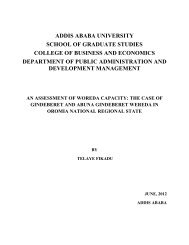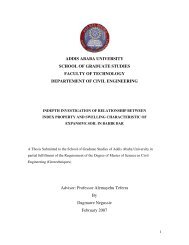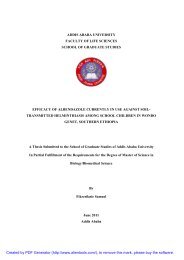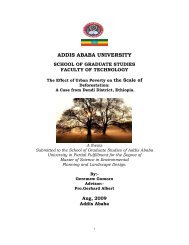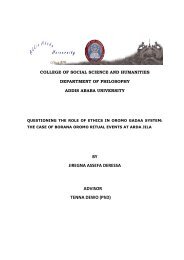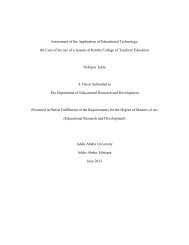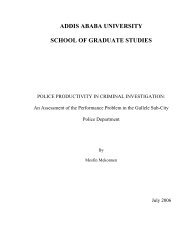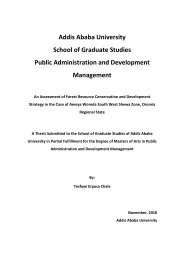FACTORS THAT CONTRIBUTE TO THE PROBLEMS EFL ...
FACTORS THAT CONTRIBUTE TO THE PROBLEMS EFL ...
FACTORS THAT CONTRIBUTE TO THE PROBLEMS EFL ...
You also want an ePaper? Increase the reach of your titles
YUMPU automatically turns print PDFs into web optimized ePapers that Google loves.
4.3 The listening factor that poses the most difficulty for the learners<br />
As mentioned in chapter three, the questionnaire was administered to 149 <strong>EFL</strong> learners<br />
during class time. As far as item number 20 was concerned, however, only 130<br />
questionnaires were accepted for the study. The other 19 questionnaires were not taken<br />
seriously by the respondents, and were excluded from the study.<br />
Table-6: Learners’ responses that refer to the listening problem that poses the most difficulty for<br />
them<br />
Item<br />
No<br />
Statements Students<br />
No.<br />
Students<br />
%<br />
1 Unfamiliar words including jargon and idioms interfered with my<br />
listening comprehension.<br />
2 1.5<br />
2 Complex grammatical structures interfered with my listening<br />
comprehension.<br />
1 0.77<br />
3 Long spoken text made me tired and interfered with my listening<br />
comprehension.<br />
8 6.15<br />
4 Information that was not crucial to me and that could not generate<br />
sufficient interest to me did not make me to continue listening.<br />
2 1.5<br />
5 The length and complexity of sentences interfered with my<br />
listening comprehension.<br />
2 1.5<br />
6 Unfamiliar topic/subject matter interfered with my listening<br />
comprehension.<br />
3 2.3<br />
7 At the time of listening I found it difficult to predict what would<br />
come next.<br />
5 3.8<br />
8 I found it difficult to recognize the words I know because of the<br />
way they are pronounced.<br />
24 18.5<br />
9 I found it difficult to understand the meaning of the spoken text<br />
without seeing the speaker’s facial expressions & gesture (e.g.<br />
frowning face of anger)<br />
4 3<br />
10 There were words that I would normally understand in writing, but<br />
when I heard them in a stream of speech, I found it difficult to tell<br />
where one word finishes and another begins.<br />
4 3<br />
11 I found it difficult to get a general understanding of the spoken text<br />
from the first listening.<br />
4 3<br />
12 I feel worried and discouraged when I don’t immediately<br />
understand the spoken text.<br />
1 0.77<br />
13 I found it difficult to answer questions which require other than a<br />
short answer (e.g. why or how questions, or writing a summary).<br />
2 1.5<br />
14 Speaker’s fast speech interfered with my listening comprehension. 26 20<br />
15 The speech of the native speakers with different speaking styles<br />
from what is familiar to me interfered with my listening<br />
comprehension.<br />
11 8.5<br />
16 The speech of the native speakers with different pronunciation<br />
from what is familiar to me interfered with my listening<br />
comprehension.<br />
26 20<br />
17 Unclear sounds resulting from poor quality tape-recorder or<br />
cassettes interfered with my listening comprehension.<br />
1 0.77<br />
18 Lack of sufficient time for carrying out the tasks interfered with<br />
my listening performance.<br />
53<br />
4 3




